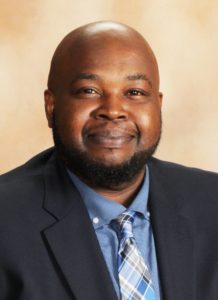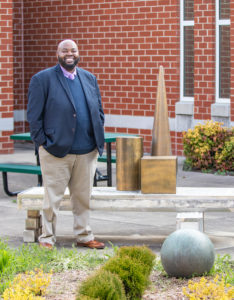Rodney Robinson was inspired to become a teacher because of his mother. Growing up in rural Virginia, segregation and poverty hindered her own education, but it didn’t stop her from finding her calling teaching young children in her home daycare.

“She always taught us that every child deserves the proper amount of love to get where he or she needs,” Robinson said.
Named 2019 National Teacher of the Year, he will share his teaching philosophies, and his support of economic and cultural equity in the classroom, with aspiring educators from UMW’s College of Education and the local community. The talk will take place next Wednesday, Jan. 29, at 6 p.m. in Dodd Auditorium.
Robinson said he took his mother’s lesson, which he shared recently with his alma mater, Virginia State University (VSU), to heart. Since 2015, he’s taught history at a juvenile detention center in Richmond, believing that access to a quality education and empathetic teachers can be keys to success for these students.
“Mr. Robinson is making a positive difference in the lives of students who need it the most,” said Pete Kelly, Dean of UMW’s College of Education. “As the National Teacher of the Year, he has an important story to tell, and I encourage everyone to come hear him speak.”
A native of King William County, Virginia, Robinson was dedicated to his studies but struggled as one of few black students at his high school. The familial culture he found at VSU – and the professors and peers who encouraged him – gave him the confidence to reach his full potential. After receiving a bachelor’s degree in history, Robinson worked for 15 years in Richmond City Public Schools and earned a master’s degree in educational administration from Virginia Commonwealth University.

A desire to help vulnerable students led him to the Virgie Binford Education Center, located inside the Richmond Juvenile Detention Center, where he’s developed a civic-centered curriculum and collaborative partnerships between himself and his students. His “whole child” approach encourages emotional and social growth and aims to prevent young people from entering the school-to-prison pipeline.
These teens, he has learned, have the same passions, dreams and aspirations as other students. “America is a country of second chances,” he told his alumni magazine. “In order for them to achieve … they deserve a quality education like everyone else.”
Robinson’s work has earned him numerous honors, including the Greater Richmond Community Foundation’s R.E.B. Award for Teaching Excellence. Published three times by Yale University, he’s helped develop curriculum units on race, class and punishment for the Yale Teacher’s Institute. He’s also been appointed to Richmond Mayor Levar Stoney’s Education Compact Team, a group of educators, politicians, and business and community leaders who are working with city administrators and local colleges and universities to recruit underrepresented male teachers.
In his quest to ensure that all students have the resources they need to be successful – and that they have teachers who look like them and understand their experiences – he’s encouraging legislators on Capitol Hill to support increased diversity among educators.
“I feel right now it’s important to elevate my voice and … those kids’ stories, and I can be a better help outside the classroom than I can inside,” he told VSU. “I will always take the job that’s the best position to advocate for my kids.”
Thank you to Virginia State University’s Alumni Magazine for assistance with this story.